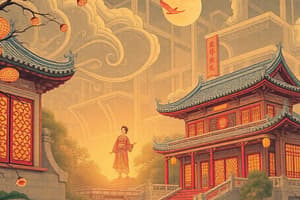Podcast
Questions and Answers
Who took power in China in 1978 and instituted large-scale political and economic reforms?
Who took power in China in 1978 and instituted large-scale political and economic reforms?
- Deng Xiaoping (correct)
- Hua Guofeng
- The Gang of Four
- Mao Zedong
What did the CCP members known as the 'Eight Elders' influence during Deng Xiaoping's leadership?
What did the CCP members known as the 'Eight Elders' influence during Deng Xiaoping's leadership?
- Communal living
- Cultural Revolution
- Military operations
- Economic reforms (correct)
What was a major focus of China's economic strategy under Deng Xiaoping's rule?
What was a major focus of China's economic strategy under Deng Xiaoping's rule?
- Privatization of agriculture (correct)
- Tightening governmental control
- Increased state-owned enterprises
- Expansion of communes
What event marked China's transition from a planned economy to a mixed economy with an open-market environment?
What event marked China's transition from a planned economy to a mixed economy with an open-market environment?
What constitutional change occurred in China on December 4, 1982?
What constitutional change occurred in China on December 4, 1982?
What event in 1989 led to large pro-democracy protests in China?
What event in 1989 led to large pro-democracy protests in China?
During Jiang Zemin's rule, what major event occurred in 1997 and 1999?
During Jiang Zemin's rule, what major event occurred in 1997 and 1999?
Which Chinese leader succeeded Jiang Zemin as the paramount leader?
Which Chinese leader succeeded Jiang Zemin as the paramount leader?
What major environmental issue was a result of China's high rate of economic growth under Hu Jintao?
What major environmental issue was a result of China's high rate of economic growth under Hu Jintao?
Which geographical feature separates China from much of South and Central Asia?
Which geographical feature separates China from much of South and Central Asia?
Where is the geographical center of China located?
Where is the geographical center of China located?
What type of landscape dominates Southern China?
What type of landscape dominates Southern China?
Flashcards are hidden until you start studying
Study Notes
Reforms and Contemporary History
- After Mao's death, the Gang of Four was arrested and held responsible for the excesses of the Cultural Revolution.
- Deng Xiaoping took power in 1978 and instituted large-scale political and economic reforms.
- The CCP loosened governmental control over citizens' personal lives, and communes were gradually disbanded in favor of working contracted to households.
- The Cultural Revolution was rebuked, with millions of its victims being rehabilitated.
- Agricultural collectivization was dismantled and farmlands privatized, while foreign trade became a major new focus, leading to the creation of special economic zones (SEZs).
Economic Reforms
- Inefficient state-owned enterprises (SOEs) were restructured, and unprofitable ones were closed outright, resulting in job losses.
- China transitioned from a planned economy to a mixed economy with an increasingly open-market environment.
- China adopted its current constitution on December 4, 1982.
Pro-Democracy Protests and Tiananmen Square Massacre
- In 1989, large pro-democracy protests led to the Tiananmen Square massacre.
- Jiang Zemin replaced Zhao Ziyang as the CCP general secretary, and Zhao was put under house arrest for sympathizing with the protests.
Jiang Zemin's Rule
- Jiang continued economic reforms, further closing many SOEs and massively trimming down "iron rice bowl" occupations.
- During Jiang's rule, China's economy grew sevenfold.
- British Hong Kong and Portuguese Macau returned to China in 1997 and 1999, respectively, as special administrative regions under the principle of one country, two systems.
- China joined the World Trade Organization in 2001.
Xi Jinping's Rule
- Xi Jinping succeeded Hu as paramount leader between 2012 and 2013.
- Xi launched a vast anti-corruption crackdown, prosecuting more than 2 million officials by 2022.
- During his tenure, Xi consolidated power unseen since the initiation of economic and political reforms.
Geography of China
- China's landscape is vast and diverse, ranging from the Gobi and Taklamakan Deserts in the arid north to the subtropical forests in the wetter south.
- The Himalaya, Karakoram, Pamir, and Tian Shan mountain ranges separate China from much of South and Central Asia.
- The Yangtze and Yellow Rivers, the third- and sixth-longest in the world, respectively, run from the Tibetan Plateau to the densely populated eastern seaboard.
- China's coastline along the Pacific Ocean is 14,500 km (9,000 mi) long and is bounded by the Bohai, Yellow, East China, and South China seas.
Studying That Suits You
Use AI to generate personalized quizzes and flashcards to suit your learning preferences.





